
Related
The Sydney Morning Herald reported that Iraq’s new unelected Iraqi Prime Minister, Iyad Allawi, personally shot dead six suspected members of the Iraqi resistance who were handcuffed and blindfolded at a Baghdad police station just days before he became prime minister. We speak with award-winning reporter Paul McGeough who broke the story and has since left Iraq for his own safety. [includes rush transcript]
In just three weeks in power, Iraq’s unelected Prime Minister Iyad Allawi has assumed the authority to impose martial law, ban demonstrations and monitor citizens’ phones and email. He has praised U.S. airstrikes on Fallujah and threatened to crush the country’s armed resistance.
But the most shocking story appeared last week in Sydney Morning Herald which reported that Allawi personally shot dead six suspected members of the Iraqi resistance at a Baghdad police station just days before he became prime minister. The newspaper based its report on two eyewitnesses who said Allawi used a pistol to execute six prisoners who were handcuffed and blindfolded. Iraq’s Human Rights Minister announced he is opening an investigation into the allegation which Allawi has strongly denied.
The story was first reported by award-winning journalist Paul McGeough at the Sydney Morning Herald who has since left Iraq for his own safety.
- Paul McGeough, correspondent for the Sydney Morning Herald.
Transcript
AMY GOODMAN: Welcome to Democracy Now!.
PAUL MCGEOUGH: Good afternoon.
AMY GOODMAN: It’s good to have you with us. Can you tell us exactly what you understand about the prime minister, Iyad Allawi’s involvement — alleged involvement, in the killing of six Iraqis?
PAUL MCGEOUGH: I have interviewed two witnesses — two people who say they witnessed what happened in the courtyard at the Allam Riyadh police station. I interviewed them separately. Each did not know that I had spoken to the other. In getting to them, I used only personal channels, so there was no room for people involved in political, military or religious organizations to put a damaging story in place against Allawi. It was — their stories were told reluctantly, they were told with fear and also they were also told with a pat on the back to Allawi for having done this, because both witnesses were — they shared the widely-held view of Iraqis that this was a good thing in terms of letting the terrorists, as they call them, know what fate they had. The two stories as told by the witnesses were that Allawi made a surprise visit to this police station at about 10:00, 10:30 in the morning. All of the police on duty were called together. He gave them a pep talk, urging them on to be brave and strong and courageous in their work, go after the terrorists, fight for the new Iraq. All of this was because of the crisis of problems that confronts the police in Iraq these days. They’re under-trained. They’re under-equipped. They have a morale problem. They’re under constant fire from insurgents. They don’t know if they’re going to be shot in their own homes or if their police stations are going to be blown up. As told to me, after the pep talk the prime minister went on a tour of the police complex. He — his tour ended up in a small courtyard where the prisoners were lined up against a wall. They were handcuffed, they were blindfolded. While they were against the wall there was an exchange between the prime minister and the Iraqi interior minister, who was also present, and also between Allawi and the prisoners. He threw questions at them. You know, “Why do you do this? Are you with Saddam? Are you fighting with Saddam? Why do you kill Iraqis?” He turned to those around him and said, “These people are responsible for killing as many as 50 Iraqis each.” At that point, the interior minister said to have interjected saying that he thought that all of the prisoners should be killed on the spot. The prime minister replied, “no, they deserved worse than this,” but having said that, he pulled a pistol from his belt. Several of the witnesses — several of the people who were present were of the view — concluded that this was in fact a Belgian-made Browning pistol that he used. He stood in the one spot and — moved his outstretched arm through an arc left to right, pausing at each prisoner and shooting them in the head.
AMY GOODMAN: This is a story that has gotten front-page coverage in your paper, the leading paper of Australia, the Sydney Morning Herald. It’s almost gotten no attention in this country or the British press. Can you explain?
PAUL MCGEOUGH: It’s a difficult story to get into. The story has been reported quite widely as a story. “Newsweek” has followed it up. “The Toronto Star,” ran everything in full that I wrote. Several of the British dailies have reported it as an account of my story, but to get into a story like this, you can’t do it overnight. It took three weeks of work by myself to get to the point where both I and my editors were satisfied that we could publish. To get to witnesses is not easy, so the notion that somebody could turn around and produce a publishable version of this story for a newspaper or a news bulletin in a 24-hour turn-around doesn’t make sense. Nobody followed up on other massacres on day two. It just doesn’t happen with a major story like this.
AMY GOODMAN: I only have minute, but why have you left Iraq?
PAUL MCGEOUGH: I discussed this with a few of my colleagues, and because of the incredible lack of security in Iraq for westerners even before you write something such as this, I took their advice and I agreed with it, that it was probably in my better interests not to be in Iraq when I published.
AMY GOODMAN: I want to thank you very much for joining us, Paul McGeough, correspondent for the Sydney Morning Herald, front-page story in Australia that the unelected prime minister Iyad Allawi shot dead six prisoners a few days before he was appointed to his position.


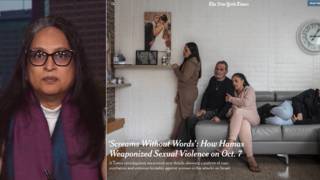
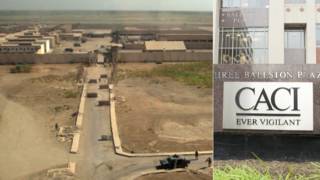
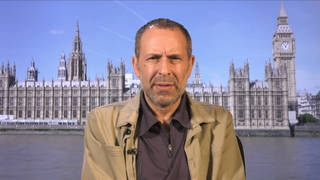





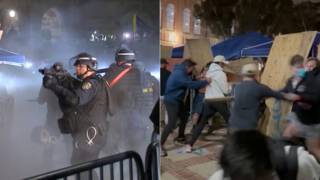
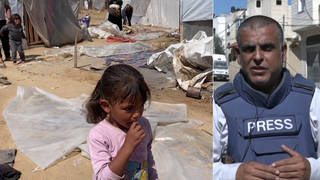
Media Options